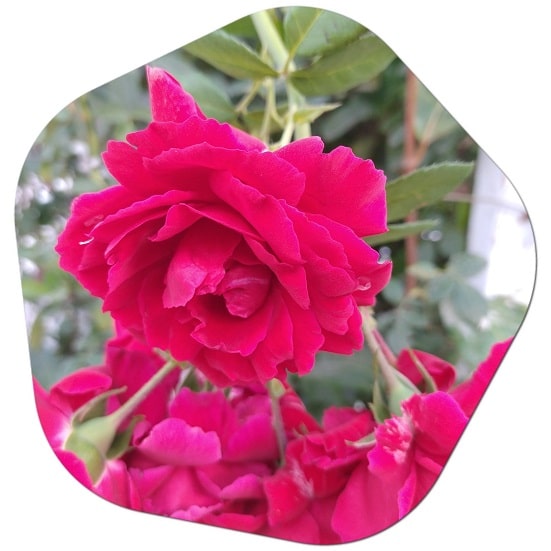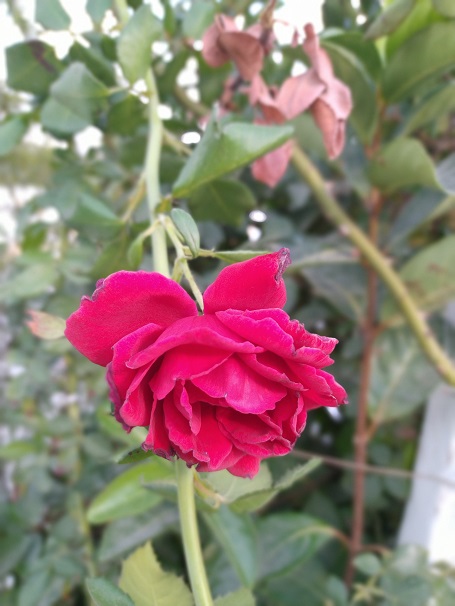Why are roses important to humans?
Roses are synonymous with the concepts of beauty and love. It seems that roses actually offer beauty-enhancing benefits. This iconic flower works wonders on the skin in particular, which is why they have been included in cosmetics, medicines and herbal treatments for centuries. Rose oil has antibacterial, antifungal and antiviral properties, which can be used to treat many ailments topically, including skin problems. Rose has also been used to relieve sore throats, fever and coughs. So, what are the benefits of Rose?
Rose can help with weight loss
Rose petals contain compounds that help cleanse the body of toxins and, in addition, speed up metabolism and thus aid weight loss. Apart from that, eating a handful of rose petals suppresses hunger, prevents you from eating more and thus helps you lose weight naturally.

Roses are natural moisturizers
The natural oils found in roses keep the skin moisturized and smooth. Roses are especially beneficial for those with sensitive skin, as the sugars in the petals create a soothing sensation.
Roses give a relaxing effect
When used aromatically, the rose is calming and relaxing. In fact, rose petals are used in Ayurvedic medicine to detoxify and calm the body.
Rose provides protection against sun rays
Rose contains high amounts of vitamin C, a powerful antioxidant. This important vitamin can help protect skin cells from damage, such as staying in the sun for too long. Some evidence even shows that rose water can help prevent sunburn.
What is the importance of the rose for people?
Roses hold significant importance to humans for a variety of reasons, both cultural and practical. Here are several ways in which roses are important to us:
- Symbolism and Sentiment: Roses are powerful symbols of love, beauty, and romance. They have been used for centuries to convey emotions and sentiments, particularly in the form of gifts. Different colors of roses are associated with different meanings. For example, red roses symbolize love and passion, while white roses represent purity and innocence.
- Aesthetic Beauty: Roses are renowned for their exquisite beauty, with their vibrant colors and intricate petal patterns. They are a favorite choice for ornamental gardens, adding visual appeal and elegance to landscapes.
- Fragrance: Many rose varieties produce captivating fragrances. The scent of roses is widely used in the perfume and fragrance industry. Rose essential oils and rosewater are also used in various cosmetic and skincare products.
- Cultural and Historical Significance: Roses have played significant roles in art, literature, and cultural traditions throughout history. They have been featured in poetry, paintings, and other forms of artistic expression. For example, the “War of the Roses” is a famous historical event that used roses as symbols.
- Medicinal Uses: Certain rose species and their components have been used in traditional medicine for their potential health benefits. Rosehip, for instance, is rich in vitamin C and is used for its potential antioxidant properties.
- Culinary Uses: Rose petals and rosewater are used in cooking and baking to add flavor and aroma to a variety of dishes, desserts, and beverages. They are particularly popular in Middle Eastern and Mediterranean cuisines.
- Commercial Value: The rose industry is economically significant, encompassing the production of cut roses for the floral market, the cultivation of roses for the fragrance and cosmetics industries, and the sale of rose-related products, including oils, perfumes, and skincare items.
- Gardening and Horticulture: Roses are beloved by gardeners and horticulturists for their versatility, making them suitable for various climates and landscaping purposes. They are often featured in public and private gardens, providing enjoyment to garden enthusiasts.
- Cultural and Religious Ceremonies: Roses are used in various cultural and religious ceremonies, such as weddings, funerals, and religious rituals. They hold special significance in many traditions and are often included as offerings or decorations.
- Conservation: Efforts are made to conserve and preserve endangered or rare rose species and varieties to maintain biodiversity and protect genetic resources.

In summary, roses have a multifaceted importance to humans, encompassing cultural, aesthetic, economic, and practical aspects. They hold a special place in our hearts and culture, making them one of the most cherished and iconic flowers worldwide.
What are the top 5 benefits of roses for humans?
Roses offer several benefits to humans, both for our physical well-being and emotional health. Here are the top five benefits of roses for humans:
- Aromatherapy and Relaxation: The scent of roses, often referred to as “rose essential oil” or “attar of roses,” is widely used in aromatherapy to promote relaxation and reduce stress and anxiety. Inhaling the fragrance of roses can have a calming effect on the mind and body, helping to improve mood and reduce emotional tension.
- Skin and Beauty: Rosewater and rose oil are commonly used in skincare products due to their potential benefits for the skin. They have natural anti-inflammatory and antioxidant properties, which can help soothe irritated skin, reduce redness, and combat the signs of aging. Rosewater is also used as a gentle toner and can hydrate the skin.
- Culinary Delights: Roses are used in culinary applications to add flavor and fragrance to various dishes and beverages. Rose petals and rosewater are common ingredients in Middle Eastern and Mediterranean cuisine, used in desserts, teas, and syrups, enhancing the culinary experience with their unique taste and aroma.
- Traditional Medicine: Some components of roses, such as rosehip, have been used in traditional medicine for their potential health benefits. Rosehip is rich in vitamin C and antioxidants, making it valuable for immune support and overall well-being. It is also used to address conditions like arthritis and inflammation.
- Emotional Well-being: Roses are often associated with love and positive emotions. Giving or receiving roses as gifts can boost mood, strengthen personal connections, and convey love, friendship, or appreciation. The sight of fresh roses in a room can create a pleasant and welcoming atmosphere, improving overall emotional well-being.
It’s important to note that while roses offer these potential benefits, individual responses can vary, and allergic reactions to rose products are possible. Additionally, the therapeutic effects of roses, such as in aromatherapy or skincare, can depend on the quality and purity of the rose products used. Always use rose-based products as directed and consult with a healthcare professional if you have specific health concerns. The human benefit of the rose >>
Roses Solution for acne skin
Rose oil has natural antibacterial properties, helping to treat acne and acne-prone skin. Together with its cleansing properties, rose is an ideal ingredient for face washing and cleansing. In addition to being a good moisturizer, the antibacterial properties of rose petals help dry up pimples. In addition, the presence of phenyl ethanol, an antiseptic compound, makes rose water effective against acne.
Rose relieves constipation
Rose petals act as a natural aid to treat constipation. This is because they are rich in fiber and water content and contain compounds that aid digestion by removing toxins from the body.





